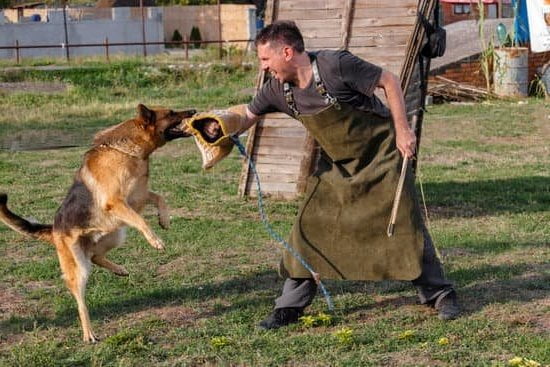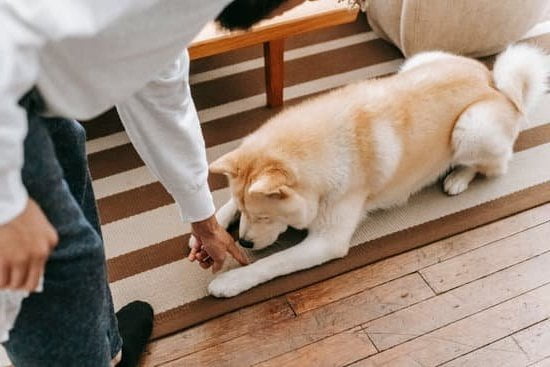Are you wondering, “can old dogs be potty trained?” Many people believe that once a dog reaches a certain age, potty training becomes impossible.
However, with the right approach and understanding of the unique challenges older dogs may face, it is absolutely possible to teach them new potty habits. In this article, we will debunk common misconceptions about old dogs and potty training and explore effective strategies for helping your senior furry friend learn to do their business in the appropriate place.
Older dogs may present certain challenges when it comes to potty training. Issues such as age-related health problems, previous training experiences, and changes in routine can all impact an older dog’s ability to learn new habits. Understanding these challenges is crucial in developing a successful potty training plan for your senior canine companion.
Patience is key when it comes to potty training an old dog. While it may take longer for an older dog to adapt to new routines and behaviors, with consistent guidance and positive reinforcement, they can certainly make progress. In the following sections, we will delve into the importance of patience and provide tips for managing frustration while staying committed to the process of potty training an old dog.
Understanding the Challenges
Older dogs often face unique challenges when it comes to potty training. Many people believe that old dogs cannot be potty trained, but with the right approach, it is possible to help them learn new habits. Understanding the reasons why old dogs may struggle with potty training is crucial in implementing an effective training plan.
Age and health are two significant factors that can impact an older dog’s ability to learn new potty habits. Older dogs may have physical limitations or health issues that make it difficult for them to control their bladder or make it to a designated potty area in time. Additionally, changes in mobility or cognitive function can also affect their ability to follow a consistent routine.
Furthermore, previous training experiences can play a role in a dog’s ability to learn new behaviors. If an older dog has been allowed to eliminate indoors for many years, breaking this habit will require patience and consistency. It is essential to understand these challenges and tailor the training approach accordingly in order to set the dog up for success. With the right strategies and persistence, old dogs can indeed be potty trained effectively.
The Importance of Patience
When it comes to potty training older dogs, the importance of patience cannot be overstated. Many pet owners believe that old dogs cannot be potty trained, but with the right approach and a lot of patience, it is possible to teach an old dog new tricks.
Emphasizing Consistency
One of the key components of successfully potty training an older dog is consistency. It’s essential to establish a routine and stick to it, taking your dog outside at regular intervals and providing plenty of opportunities for them to eliminate in the appropriate spot. This may require dedication and persistence on the part of the owner, as well as understanding that progress may take time.
Managing Frustration
It’s completely normal for pet owners to feel frustrated during the potty training process, especially when dealing with accidents or setbacks. However, it’s important to keep calm and manage frustration effectively. Taking a deep breath, reminding yourself that progress takes time, and focusing on the small victories can all help in maintaining a patient and positive attitude throughout the training process.
Seeking Professional Help
In some cases, despite all efforts and patience, potty training an older dog can still prove to be challenging. If this is the case, seeking guidance from a professional trainer or behaviorist can be extremely beneficial.
These experts can offer personalized strategies based on your dog’s specific needs and circumstances while also providing support for both you and your pet during this challenging time. Remember that every dog is different, so what works for one may not work for another – patience truly is key when it comes to potty training older dogs.
Identifying the Root Issue
Older dogs can indeed be potty trained, but it’s important to understand that they may face different challenges compared to younger dogs. One of the key aspects of successfully potty training an older dog is identifying any underlying issues that may be contributing to their potty training problems. Age-related health issues, previous training experiences, and changes in routine can all impact an older dog’s ability to learn new potty habits.
When dealing with a senior dog who is struggling with potty training, it’s essential to work with a veterinarian or professional trainer to rule out any medical issues that may be causing accidents in the house. Health problems such as urinary incontinence, arthritis, or cognitive decline can all affect a dog’s ability to control their bladder and make it harder for them to signal when they need to go outside.
In addition to medical concerns, behavioral issues such as anxiety or changes in the home environment can also contribute to potty training difficulties in older dogs. By addressing these root causes, pet owners can better understand and support their senior dogs throughout the potty training process.
| Issue | Impact |
|---|---|
| Age-related health issues | Affect a dog’s ability to control their bladder |
| Anxiety or changes in home environment | Contribute to potty training difficulties |
Choosing the Right Tools and Techniques
When it comes to potty training older dogs, choosing the right tools and techniques can make a significant difference in the success of the process. While some may believe that old dogs cannot be potty trained, with the proper approach and resources, it is absolutely possible to teach an old dog new tricks.
Effective Potty Training Methods
There are various potty training methods that can help old dogs learn new habits. One effective technique is crate training, which involves using a crate or confined space to encourage the dog to hold their bladder and only eliminate outside. Another approach is using pee pads or indoor grass patches for dogs who may have difficulty going outside due to health issues or mobility limitations.
The Power of Positive Reinforcement
Regardless of the method chosen, positive reinforcement plays a crucial role in potty training older dogs. Positive reinforcement, such as treats, praise, and rewards, helps motivate older dogs to repeat desired behaviors. When they successfully eliminate in the appropriate location, providing positive feedback reinforces this behavior and encourages them to continue doing so.
Consistency Is Key
Consistency in both training techniques and expectations is essential when potty training older dogs. Using consistent verbal cues or commands when guiding them to go outside will help them understand what is expected of them. Additionally, maintaining a consistent schedule for potty breaks is vital, as it helps older dogs anticipate when they should eliminate and prevents accidents indoors.
Establishing a Routine
When it comes to potty training old dogs, establishing a routine is crucial for success. Older dogs may have less control over their bladder and bowel movements, so consistency is key in helping them learn new potty habits. Here are some tips for creating and maintaining a routine that can help in the potty training process:
1. Set a Schedule: One of the most important aspects of establishing a routine for potty training is setting a consistent schedule for bathroom breaks. Take your older dog outside to the same spot at the same times every day, such as first thing in the morning, after meals, and before bedtime.
2. Use Verbal Cues: Implementing verbal cues when taking your dog outside can help reinforce the routine. Using phrases like “go potty” or “do your business” can signal to your dog that it’s time to eliminate.
3. Monitor Food and Water Intake: Keeping track of when your older dog eats and drinks can help you anticipate when they will need to go outside. By feeding them meals and providing water at regular intervals, you can better predict when bathroom breaks will be necessary.
4. Provide Regular Exercise: Regular exercise not only contributes to your dog’s overall well-being but also promotes regular bowel movements. Incorporating daily walks or playtime into your older dog’s routine can help regulate their bathroom schedule.
By establishing a consistent routine for potty breaks, old dogs can be more effectively trained to understand where and when they should go to the bathroom, leading to greater success in their potty training journey.
Managing Accidents
Older dogs can indeed be potty trained, but it’s important for pet owners to understand the challenges that come with this task. Here are some tips for managing accidents during the potty training process:
1. Remain Calm: It’s crucial to stay calm and composed when accidents happen. Yelling or scolding the dog can create fear and anxiety, making it even more challenging to achieve successful potty training. Instead, focus on addressing the accident calmly and redirecting the dog to the appropriate potty area.
2. Clean Accidents Thoroughly: When accidents occur, it’s essential to clean up thoroughly to eliminate any lingering odors that may attract the dog back to the same spot. Use a pet-safe cleaner specifically designed for cleaning up pet messes to ensure that the area is properly sanitized.
3. Use Accidents as Learning Opportunities: Every accident provides an opportunity for learning and improvement. Instead of dwelling on the negative aspects of accidents, use them as teaching moments for your older dog. Pay attention to any patterns or triggers that may lead to accidents and adjust your potty training approach accordingly.
By following these tips, pet owners can effectively manage accidents during the potty training process and help their older dogs develop better bathroom habits. Remaining patient, consistent, and positive throughout this journey is key to achieving success in potty training older dogs.
Celebrating Progress
In conclusion, the idea of whether old dogs can be potty trained is not as straightforward as many people may think. While there are certainly challenges associated with potty training older dogs, it is absolutely possible with the right approach and mindset. Understanding the unique challenges that older dogs face, including health issues and previous training experiences, is crucial in order to effectively address potty training problems.
Patience is key when it comes to potty training an older dog. It’s important for pet owners to remain patient and consistent throughout the process, as frustration and inconsistency can hinder progress. Identifying any underlying medical or behavioral issues that may be contributing to potty training problems is also essential, and working with a veterinarian or professional trainer can provide guidance in addressing these issues.
Choosing the right tools and techniques, establishing a consistent routine, and managing accidents in a calm manner are all important aspects of successfully potty training an older dog. It’s also important to celebrate progress along the way, no matter how small.
By maintaining a positive attitude and staying motivated throughout the process, pet owners can ultimately achieve success in potty training their older dogs. So yes, old dogs can indeed be potty trained with patience, understanding, and the right approach.
Frequently Asked Questions
Can You Housebreak an Older Dog?
Yes, it is possible to housebreak an older dog, although it may take more time and patience compared to training a young puppy. Consistency, positive reinforcement, and understanding the dog’s needs are key in successfully housebreaking an older dog.
How Long Does It Take to Potty Train an Older Dog?
The time it takes to potty train an older dog can vary depending on the dog’s previous experiences and temperament. Some dogs may learn quickly within a few weeks, while others may take several months to fully grasp the concept of potty training. It all boils down to consistency in training and reinforcing good behavior.
At What Age Is It Too Late to Potty Train a Dog?
While it is generally easier to potty train a dog at a younger age, it is never too late to teach an old dog new tricks. Dogs of any age can still learn and adapt to new routines with the right approach and consistent training. With patience and understanding, even older dogs can be successfully potty trained.

Welcome to the blog! I am a professional dog trainer and have been working with dogs for many years. In this blog, I will be discussing various topics related to dog training, including tips, tricks, and advice. I hope you find this information helpful and informative. Thanks for reading!





